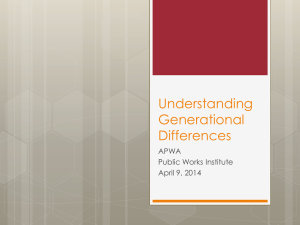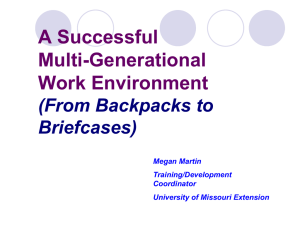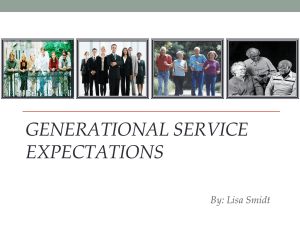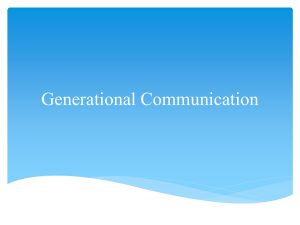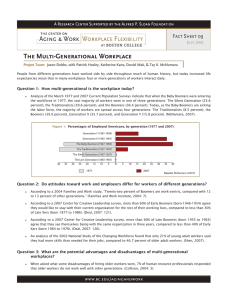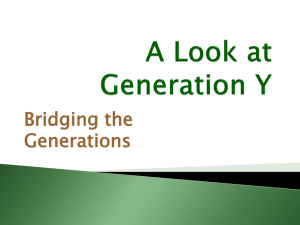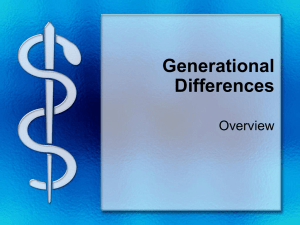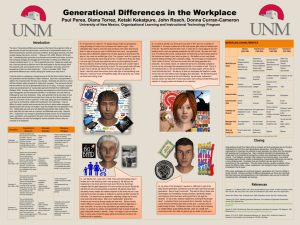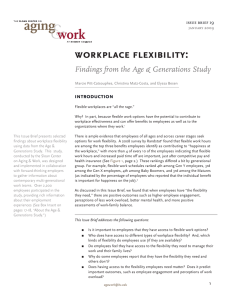Intergenerational Communication in the Workplace
advertisement
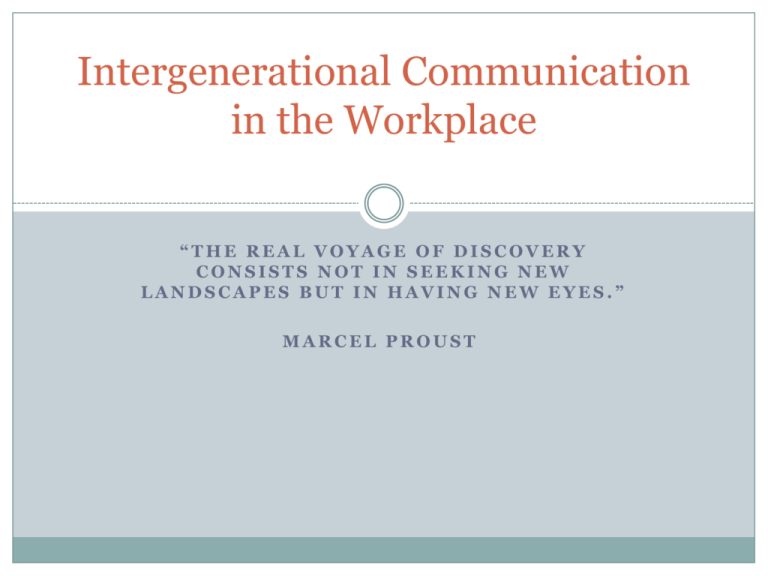
Intergenerational Communication in the Workplace “THE REAL VOYAGE OF DISCOVERY CONSISTS NOT IN SEEKING NEW LANDSCAPES BUT IN HAVING NEW EYES.” MARCEL PROUST Workshop Goals Increase knowledge and understanding of the four generations Enhance comprehension of how generational differences affect you Promote skills for effective intergenerational communication Expand capacity to manage diverse working styles across the generations Is the Generation Gap Back? Generational differences represent a critical new aspect to workplace diversity. How you view generational differences is based on your generational perspective. The Four Generations The Traditionalists The Boomers 1922–1943/46 1943–1960/1946-1964 Generation X’ers 1960-1980/1964-1980 Millennials 1980-2000 The Traditionalists Born between 1922-1943/1946 are now 57 - 81 years old Represent 25% of the work population Also known as the:veterans, seniors, traditionalists, silent generation The Baby Boomers Born between 1943-1960/1946-1964* Now between the ages of 39 and 60 72 million strong Also known as: Boomers The Generation X’ers Born between 1960-1980/1964-1980 Currently 23 – 43 years of age 17 Million Also known as: X’ers, Baby Busters, Post-Boomers The Generation Y’s or Millennials Born between 1980 and 2000 Under 23 years of age 68 Million Strong Also known as the: Nexters, Nintendo Generation, Internet Generation How Their Times Shaped Them Traditionalists: Defining Events The Great Depression & Dust Bowl The New Deal Social Security Established Golden Age of Radio Pearl Harbor Attacked WW II and Korean War Patriotism Rise of Labor Unions Traditionalists: Heroes Superman MacArthur, Patton, Halsey, Montgomery, Eisenhower FDR Winston Churchill Audie Murphy Babe Ruth Joe DiMaggio Boomers: Defining Events Economic Prosperity Expansion of Suburbia Focus on Children Television Vietnam Assassinations Civil Rights Movement Cold War/McCarthy Hearings Space Race/Moon Landing Baby Boomers: Heroes Ghandi Martin Luther King Jr. John and Jacqueline Kennedy John Glenn Feminist Movement Gen X’ers: Defining Events Watergate, Nixon resigns Challenger Disaster Computers Single-parent homes Latchkey Kids MTV AIDS Harsh economic conditions Glasnost, Perestroika Persian Gulf Gen X’ers: Heroes ? Oprah Winfrey Bill Gates & Steve Jobs Michael Jackson Michael Jordan Things, animation… Millenials: Defining Events Technology TV Talk Shows Multiculturalism Desert Storm Clinton Scandals Schoolyard Violence Oklahoma City Bombing 9/11 Columbia tragedy Millenials: Heroes ? Michael Jordan Princess Diana Mother Teresa Tiger Woods Lance Armstrong Comparing the Generations Traditionalist 1901-1942 Baby Boomers 1943-1960 Generation Xers 1961-1981 Key descriptor Loyal Optimistic Skeptical Notion of command Chain of command Change of command Self-command View of hierarchy Prefer topdown; military Comfortable with top-down Prefer flat What they’re building A legacy A stellar, upward career A portable career Job changing Carries a stigma Puts you behind Is necessary Motivator A job well done Money, title, promotion Self fulfillment, freedom, fun Workplace flexibility Who will do the work? The nerve of those Xers! I’ll go for the right lifestyle Comparing the Generations Traditionalists 1901-1942 Baby Boomers 1943-1960 Generation Xers 1961-1981 Working long hours Required, prudent Will get you ahead, money, bonus Get a life! Productivity Inputs and outputs matter Input matters most Output is all that matters Give me more… Essentials Money Time Performance reviews If I’m not yelling at you, all is fine. Once a year; welldocumented. Sorry to interrupt again, how am I doing? Work-Family Work matters most; wife at home Work matters most; dual career or divorced Family matters; dual career Career paths Slow and steady Ladder Lattice Career pace Prove yourself with loyalty; pay dues Prove yourself with I want to know all my long hours; pay dues options now. Generational Clash in the Workplace Worldwide economy Rapid change in the workplace Downsizing of companies Mergers, acquisitions, consolidations Elimination of middle management Less union activity in companies Seniority only one element of promotion Technology The Result: No job is safe, and no career assured. Causes employees to identify more with their generation and blame other generations for workplace problems and issues. The real generational workplace conflict is based on differences in values, ambitions, views, mindsets, and demographics. Traditionalist Values Dedication/sacrifice Patience Law and order Delayed reward Strong work ethic Duty, honor, country Risk averse Loyalty to the Respect for authority organization Traditionalists at Work Assets Stable Detail oriented Thorough Loyal Hard working Liabilities Inept w/ambiguity and change Reluctant to buck the system Uncomfortable with conflict Reticent when they disagree Traditionalists: Training & Development Training Take plenty of time Developing Technology Give them the “big Don’t stereotype as picture” Emphasize long- term goals Let them share their experience technophobes Use formality and order Don’t rush it Messages that Motivate Traditionalists “Your experience is respected here.” “It’s important for the rest of us to hear what has, and hasn’t, worked in the past.” “Your perseverance is valued and will be rewarded.” Boomer Values Optimism Promotion and Team work recognition Youth Work Volunteerism Personal gratification Health and wellness Boomers at Work Assets Service oriented Driven Willing to “go the extra mile” Good at relationships Want to please Good team players Liabilities Not naturally “budget minded” Uncomfortable with conflict Reluctant to go against peers Put process ahead of results Sensitive to feedback Judgmental of those who see things differently Boomers: Training & Development Training Focus on the near future Focus on challenges Development Meetings and team team building Provide develop- mental experiences Focus on their role Use business books and training tapes Messages that Motivate Boomers “You are important to our success. “We recognize your unique and important contribution to our team.” What is your vision for this project?” “You are valued.” Gen X Values Diversity Fun Thinking globally Informality Balance in life Independence Computer literacy Initiative Personal development Gen X’ers at Work Assets Adaptable Techno-literate Independent Not intimidated by authority Creative Liabilities Impatient Poor people skills Inexperienced Cynical Gen X’ers: Training & Development Training Focus on balance Offer them access to Development Electronic support many different kinds of information Keep materials brief Provide resource Help them train for lists – bullets/checklists another job Messages that Motivate Gen X’ers “Do it your way.” “We’ve got the latest computer technology.” “There aren’t a lot of rules here.” “We’re not very corporate.” Millennial Values Optimism Education Civic duty Idealism Confidence Fun Ambition/ Diversity achievement Tradition Millennials at Work Assets Loyalty Optimism Tolerant Multi-tasking Fast-thinking Technological savvy Liabilities Need for supervision and structure Inexperience, particularly with handling different people issues Service levels are low Millennials: Training & Development Training Take plenty of time Let them know what they do matters Communicate expectations Development Focus on customer service and interpersonal skills Model the behavior you want to see Large teams with strong leadership Messages that Motivate Millennials “We provide equal opportunities here.” “Your mentor is in his/her sixties.” “You are making a positive difference to our company.” “You handled that situation well.” Using the ACORN Approach Accommodate employee differences. Create workplace choices. Operate from a flexible management style. Respect competence and initiative. Nourish retention. Source: Generations At Work, Ron Zemke, Claire Raines, and Bob Filipczak “It is axiomatic that we should all think of ourselves as being more sensitive than other people because, when we are insensitive in our dealings with others, we cannot be aware of it at the time: Conscious insensitivity is a selfcontradiction.” - W.H. Auden
